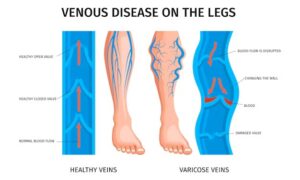Neuropathy, also known as peripheral neuropathy, is a health condition that affects the peripheral nervous system consisting of the nerves outside of the spinal cord and brain. There are different neuropathy types including:
- Diabetic neuropathy
- Peripheral neuropathy
- Autonomic neuropathy
- Hereditary neuropathy
- Radiculoplexus neuropathy
- Mononeuropathy
Each type of neuropathy has its own set of causes and symptoms, but some common causes and symptoms include:
Causes:
- Diabetes: This is the most common cause of neuropathy in the developed world. High levels of blood sugar can harm your nerves over time.
- Vitamin deficiencies: Deficiencies in vitamins B1, B6, B12, and E can lead to neuropathy.
- Alcohol abuse: If you have been abusing alcohol long-term alcohol, this can you’re your nerves.
- Autoimmune diseases: Conditions such as rheumatoid arthritis, lupus, and Guillain-Barre syndrome can cause neuropathy.
- Certain medications: Chemotherapy drugs, antiviral medications, and some antibiotics can cause nerve damage.
- Infections: Certain infections such as shingles, HIV/AIDS, and Lyme disease can cause neuropathy.
Symptoms:
- Numbness, deadness or stinging feel in your hands or feet
- Burning or stabbing pain
- Weakness or difficulty moving the affected area
- Sensitivity to touch
- Muscle cramps or twitching
- Loss of coordination
- Digestive issues, such as constipation or diarrhea
It’s important to note that the symptoms of neuropathy can vary depending on the type of neuropathy and the underlying cause. If you are experiencing any of these symptoms, it’s important to speak with neurologist doctor in South Valley’s Multi-specialty neurology practice to determine the underlying cause and receive appropriate treatment.
How is neuropathy diagnosed and treated?
Neuropathy affects the nerves and can cause a variety of symptoms such as tingling, numbness, and pain. There are different types of neuropathy, and the diagnosis and treatment will depend on the underlying cause and the specific symptoms.
To diagnose neuropathy, the doctor at South Valley Neurology will first discuss your medical history and then perform a physical examination to look for any signs of nerve damage. They may also order tests such as blood tests, nerve conduction studies, electromyography, and imaging studies to help identify the underlying cause.
The treatment of neuropathy will depend on the underlying cause and the severity of the symptoms. In some cases, addressing the underlying condition that is causing the neuropathy, such as controlling blood sugar levels in the case of diabetic neuropathy, can help alleviate the symptoms. Other treatments may include medications to help manage pain, physical therapy to improve strength and flexibility, and lifestyle changes such as exercising and quitting smoking.
Some other treatment options for neuropathy include:
- Topical treatments: Creams or gels containing capsaicin, lidocaine or other topical anesthetics may be applied to the affected area to relieve pain.
- Nerve stimulation therapies: Electrical stimulation may be used to help manage pain and improve nerve function. Examples include transcutaneous electrical nerve stimulation (TENS) and spinal cord stimulation (SCS).
- Medications: Certain medications, such as anticonvulsants and antidepressants, can help manage pain and improve nerve function.
- Alternative therapies: Acupuncture, massage, and other complementary therapies may help alleviate symptoms and improve overall well-being.
It is important to work with a neuropathy specialist to determine the best course of treatment for your specific case of neuropathy.



































